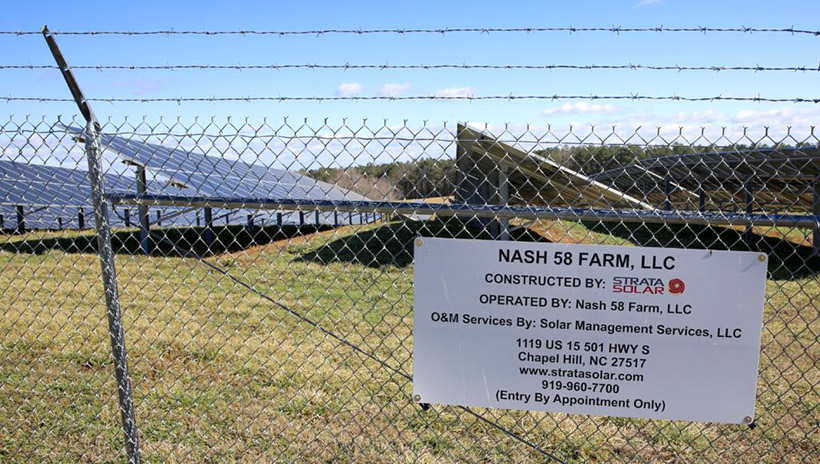Publisher's note: This post appears here courtesy of the Carolina Journal, and written by Don Carrington.
A ground-level photo of the land housing a solar farm from which Gov. Roy Cooper and his brother, Judge Pell Cooper, received lease payments for most of 2013 and 2014. | Photo: Don Carrington/Carolina Journal
Gov. Roy Cooper, an advocate for renewable energy whose family leases land for solar farms, is denying tax credits for solar energy investments.
Investors could lose as much as $500 million they were expecting from the state, one tax lawyer told
Carolina Journal. Cooper's Department of Revenue is basing the decision on a faulty interpretation of the law defining partnerships, tax experts and lawyers say.
For two decades, the state has encouraged investments by individuals and businesses in renewable energy partnerships. The most recent version of the incentive gave investors a 35% tax credit on money they invested. The credit must be taken in five equal installments.
The program ended in 2016, but investors who had projects under way could continue taking credits.
Some solar project builders created partnerships to transfer the credits, essentially selling them to individuals or businesses with substantial tax liabilities.
CJ has reported some of these partnerships involved insurance companies, banks, and other financial institutions, not just utilities or energy businesses.
These pass-through entities drew the attention of DOR. In September, it issued a notice disallowing credits for some partnership arrangements used to finance solar projects. DOR said the federal Internal Revenue Code doesn't allow such arrangements, so the state shouldn't allow them, either.
Some attorneys familiar with tax law say DOR's interpretation is wrong.
Kay Hobart of the Raleigh office of Parker Poe wrote about the issue in April for
Bloomberg Daily Tax Report. Before joining Parker Poe, she served as special deputy attorney general leading a team of lawyers representing DOR.
Hobart called DOR's ruling on partnerships
"a new and extremely restrictive interpretation that is taking investors, developers, and the market by surprise." She said the DOR's position would put hundreds of millions of dollars of anticipated tax credits at risk. She said it appears to be at odds with the intent of the General Assembly and a recent N.C. Supreme Court decision involving the Internal Revenue Code.
In July, N.C. Chamber General Counsel
Ray Starling wrote about the issue in
Triangle Business Journal. He said the promise of a 35% tax credit made many of the projects economically feasible. The credits ended in 2016, and the safe-harbor provision should have allowed investors to continue collecting credits. But DOR is disallowing credits for the final three years of the program, even though the law hasn't changed, Starling said.
He said DOR's actions threaten other tax credit programs, including the one for rehabilitating historic structures. By
"changing the rules of the game on taxpayers after the game was over, the DOR is threatening North Carolina's favorable tax climate," he said.
CJ recently reported North Carolina has issued more than $1 billion in renewable energy tax credits through 2018. A North Carolina attorney representing a client affected by the situation spoke to
CJ under a promise of anonymity because his client's situation is under review. The attorney said DOR began questioning the credits in April 2017, but waited until September 2018 to send an advisory. By then, investments had been made. Credits were taken under the assumption they were legal.
The attorney said the partnership model DOR has challenged was frequently used.
DOR Director of Public Affairs Schorr Johnson told
CJ the agency can neither comment on nor confirm any audit activity or taxpayer information.
"The department supports renewable energy and historic preservation tax credits as allowed by law," he said.
Johnson didn't respond to questions from
CJ estimating the value of the rejected tax credits or identifying who changed the interpretation of partnerships Starling mentioned.
Johnson
reiterated the DOR position that some partnerships aren't eligible for tax credits because DOR applies the federal Internal Revenue Code definition of a partner - which excludes the type of pass-through entities that often obtain these credits.
North Carolina has nearly 500 utility scale solar projects.

